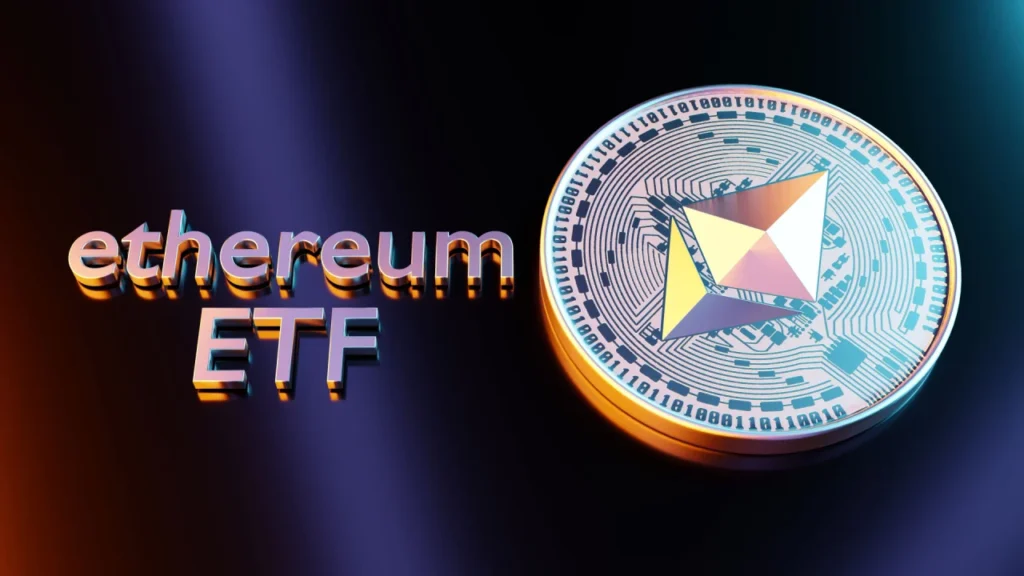The cryptocurrency market is abuzz with speculation about the potential approval of a Spot Ether ETF (Exchange-Traded Fund) by the U.S. Securities and Exchange Commission (SEC). This development could have far-reaching implications for Ethereum (ETH), the second-largest cryptocurrency by market capitalization, and the broader crypto market. This article explores the significance of a Spot Ether ETF, the current market sentiment, and the potential future of Ethereum ETFs.
Understanding Spot Ether ETFs
A Spot Ether ETF is a financial product that allows investors to gain exposure to Ethereum without directly owning the cryptocurrency. Unlike futures-based ETFs, which derive their value from contracts speculating on the future price of Ether, a Spot Ether ETF holds actual Ether in its reserves. This structure provides investors with a regulated and familiar investment vehicle, simplifying access to Ether’s price movements and potentially attracting institutional investors who may be restricted from directly trading cryptocurrencies due to regulatory concerns
The SEC’s Role and Market Sentiment
The SEC’s decision on whether to approve Spot Ether ETFs is highly anticipated. Historically, the SEC has been cautious about approving cryptocurrency ETFs due to concerns about market manipulation and investor protection. However, recent developments suggest a shift in the SEC’s stance. The agency has reportedly asked major exchanges like Nasdaq, Cboe, and the New York Stock Exchange to amend their applications to list Spot Ether ETFs, signaling a potential approval
Analysts and market participants are optimistic about the approval. Bloomberg ETF analysts Eric Balchunas and James Seyffart have raised their approval odds from 25% to 75%, citing increased engagement from the SEC and political pressure to embrace digital assets This optimism has driven Ether’s price to new highs, with the cryptocurrency experiencing significant gains in recent days
Potential Impact on Ether’s Price
The approval of a Spot Ether ETF could have a substantial impact on Ether’s price. Analysts at QCP Capital predict that Ether could rally to $4,000 in the short term and potentially reach $5,000 later this year if the ETF is approved Similarly, AllianceBernstein analysts expect a 75% rally in Ether’s price, drawing parallels to the price action seen with Bitcoin following the approval of its Spot ETF.
The increased demand for Ether from institutional investors and the broader accessibility provided by the ETF could drive significant price appreciation. Additionally, the deflationary nature of Ether, with a 0.2% annualized deflation rate since the Ethereum network’s transition to proof-of-stake, further supports a bullish outlook.
Broader Implications for the Crypto Market
The approval of a Spot Ether ETF would not only impact Ether but also have broader implications for the cryptocurrency market. It would signal increased regulatory acceptance of digital assets, potentially paving the way for ETFs investing directly in other cryptocurrencies like Solana (SOL) and Avalanche (AVAX). This could lead to a surge in institutional money flowing into the crypto space, boosting the market’s overall liquidity and stability.
Moreover, the approval could set a precedent for other regulatory bodies worldwide, encouraging them to adopt similar measures and further legitimizing cryptocurrencies as an asset class. This would enhance the global adoption of digital assets and foster innovation within the crypto ecosystem.
Challenges and Considerations
Despite the optimism, there are challenges and considerations to keep in mind. The SEC’s ongoing investigation into whether Ether qualifies as a security adds a layer of uncertainty to the approval process. The agency’s concerns about staking, where Ether is locked up to support the network and earn rewards, have led to legal actions against exchanges offering staking services. This has prompted some ETF issuers to amend their applications to exclude staking, aiming to address the SEC’s concerns.
Additionally, the potential concentration risk within the Ethereum network is another consideration. Analysts warn that large-scale staking by ETFs could centralize validator power, posing risks to the network’s decentralization and security.
Conclusion
The potential approval of a Spot Ether ETF by the SEC is a significant development for the cryptocurrency market. It could drive Ether’s price to new highs, attract institutional investors, and pave the way for broader adoption of digital assets. However, challenges such as regulatory uncertainties and concentration risks must be carefully managed.
As the SEC’s decision deadline approaches, the crypto community remains on high alert, eagerly anticipating the outcome. Whether approved or not, the discussions and developments surrounding Spot Ether ETFs highlight the evolving landscape of cryptocurrency regulation and the growing acceptance of digital assets in the traditional financial system.


 ไทย
ไทย
